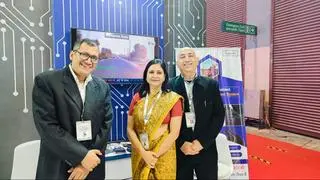At 50, cardiovascular surgeon Soma Guhathakurta enrolled for a PhD at IIT-Madras with an ambition to develop a human-heart valve.
But her advisor Venkatesh Balasubramanian, Head of Rehabilitation Bioengineering Group, suggested she work on developing a biomaterial for valves. That led to the creation of India’s first tissue-engineered pericardial patch developed from the sack of a buffalo’s heart.
In three years, she got her PhD for a dissertation on a biomaterial derived from bovine pericardium. This is a tissue-engineered patch for humans and animals from buffalo collagen.
The research led to the development of a low-cost, life-saving, natural, biomaterial that can replace imported patches.
Now, 63, Guhathakurta’s research has resulted in the development of SynkroScaff, a bovine pericardial patch for critical cardiovascular patients. “Till this research, the patch was imported and was expensive. However, we ensured the patch is available at half the cost,” she said without disclosing the cost.
Guhathakurta stopped practising medicine to become a research student, and has commercialised her invention with the backing of Chennai-based SynkroMax Biotech. The firm has invested about ₹3 crore in a unit in Sriperumbudur, on the western outskirts of the city, to manufacture around 1,000 SynkroScaff patches a month, she said.
Balasubramanian said SynkroScaff was designed in the lab, then translated into a viable and affordable critical-healthcare product. “This is an example of a life-saving product that was designed and made in India for the world,” he said.
Leading hospitals such as Madras Medical Mission, Fortis, Kauvery, SRM and ICF have tested the patch on patients.
Suresh Rao, Director, Children’s Heart Centre, Kokilaben Dhirubhai Ambani Hospital and Medical Research Institute, Mumbai, in a testimony to the company said he has used SynkroScaff patch for corrections inside and outside the heart of children with congenital heart defects. The product could generate short-, mid- and long-term data from India that could clinically validate the product in India and across the world.
The Central Department of Biotechnology awarded Guhathakurta with the ‘Biotech Product Process Development and Commercialisation Award’ for 2017.
“Our invention is India’s first import-substitute, biomedical device [application wise],” Guhathakurta said.
The advantage of SynkroScaff is that it integrates with the patients’ bodies and functions as their own tissue. Cardiothoracic and cardiovascular surgeons require a lot of biomaterials in operation theatres. Bovine collagen is similar to human collagen and is unlikely to have bio-compatibility issues. Once the buffalo cells are removed, immunity issues are not there as the base material is compatible, she said. Though imported biomaterials — synthetic and biological — are available in the market, there are issues such as availability and cost. Further, imported biological patches are processed and preserved using glutaraldehyde, which is toxic.
Integrated with systemEven though resterilisation of patches is not recommended, it is practised to reduce costs, she said. “We don’t realise that when the patches are resterilised, mechanical or other properties go down, and there is always a danger of infection.” Whereas, SynkroScaff gets integrated with the system as body’s own and with blood supply. “This was the whole idea of my research so that the material grows with the body,” she said.
The patch was validated in the lab and also by large and small animal studies with unique experiments. It may not make liver or kidney, but it can be used where a patch work or sling work is necessary or for repair of less-complicated organs.
On her enrolment to IIT- Madras, Guhathakurta said. “After 30 years of being a practising clinician and surgeon, I completely transitioned into a researcher after starting my PhD.”
Guhathakurta is currently pursuing work on developing other tissue- engineered products and regenerative medicine using stem- cell technology.








Comments
Comments have to be in English, and in full sentences. They cannot be abusive or personal. Please abide by our community guidelines for posting your comments.
We have migrated to a new commenting platform. If you are already a registered user of TheHindu Businessline and logged in, you may continue to engage with our articles. If you do not have an account please register and login to post comments. Users can access their older comments by logging into their accounts on Vuukle.